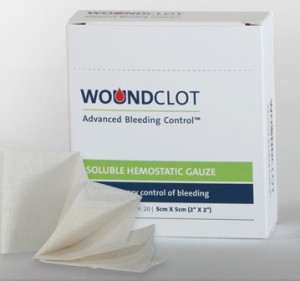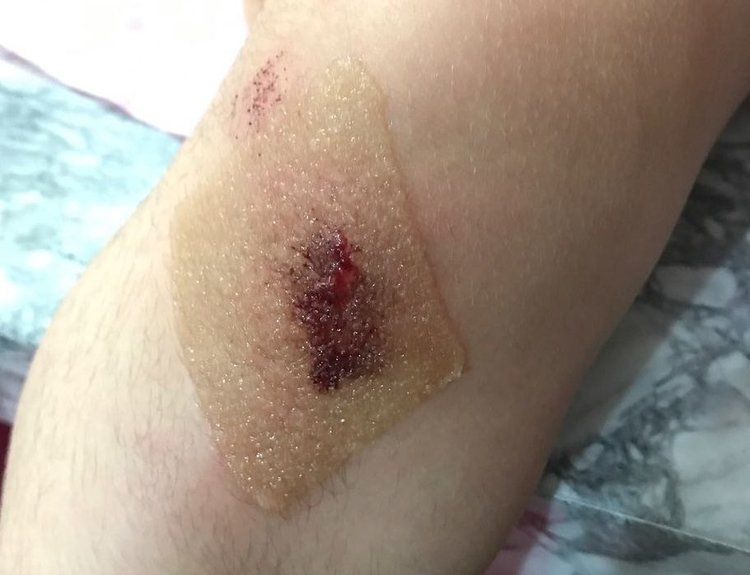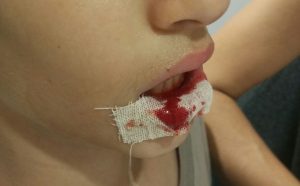In September 2016, two Israeli police officers were stabbed in a terror attack in Jerusalem, one of several dozen such attacks that year. One of the officers was seriously injured and bleeding profusely from a stab wound to the neck, which hit a major artery. A paramedic who rushed to the scene managed to save the officer’s life by applying a then newly available, Israeli-developed bandage that stopped the bleeding in under a minute.
That bandage was WoundClot, a plant-based gauze that stimulates the body’s coagulation process and stops blood loss. The bandage, made out of cellulose (plant cells), can absorb over 2500 percent of its own weight and can be applied in situations in which compression can be harmful, such as with stab wounds, head and neck injuries, and internal bleeding. It is also bio-absorbable, remaining biologically active for 24-36 hours and breaking down naturally in the body within a week.
When applied to an injury, the single-use bandage turns into a gel-state membrane, forming a “3D matrix [that] traps platelets [clotting blood cells] and coagulants…while retaining their mobility and activity to form a biological clot,” the company says.
In the case of the injured officer, her bleeding was stopped and further hemorrhaging was prevented even before she reached the hospital.
The WoundClot bandage made international headlines in 2016 when the Israeli medical company behind it, Core Scientific Creations (CSC), first launched it.
CSC now sells WoundClot and a number of other medical supplies to distributors in 32 countries including Italy, India, Vietnam, the UK, Poland, Romania, and France.

CSC founder and CEO Yuval Yaskil says the products are used mainly in public institutions like hospitals, dialysis clinics, law enforcement systems, and militaries. A small portion goes to private medical professionals, a majority of them surgeons but also nurses, paramedics, and dentists. Its products meet FDA and CE standards.
Yaskil tells NoCamels that following the 2016 attack, Israel’s chief of police told him “every police officer must have [a WoundClot bandage] in his pocket,” and that the gauze has helped save many lives.
WoundClot is priced at $10 per bandage and $100 for larger surgical kits. While not the cheapest, it claims to be of the highest quality.
Yaskil has high hopes for WoundClot, and says he hopes “WoundClot is going to be recognized, as it should, as the leading product in bleeding control and that in the next ten years there will be ten or fifteen specific applications and broad applications… and that WoundClot will be the leading technology, the one everyone will need to pass through in order to enter the market.”

CSC is now in the last step of a capital round to attract investment from venture capital firms and Yaskil says the company is looking for strategic investments. “We are not trying to be a startup that sells out after a couple of years,” he says.
Thinking about blood loss
Yaskil is among the original investors in CSC. He says the idea first came to him some 20 years ago while he was working at an Israeli medical supplies distribution company and thinking about products that prevent blood loss, one of the leading causes of death among trauma victims.
According to a 2009 study published in the New England Journal of Medicine, over 50 percent of deaths occurring within 48 hours of traumatic injury result from blood loss, and according to the US Department of Defense, 84% of all “preventable battlefield deaths” result from bleeding.
Yaskil says that in 2004 he discovered a product that he thought “would be a leap forward in bleeding control” and started importing it. “I learned the field really well and found all the limitations,” he says.
After gaining more experience and while studying the industry, in 2009 Yaskil began thinking how to go about developing what he thought was “the perfect product,” one that could stem severe bleeding without the need for compression and would be bio-absorbable.
The final push came in February 2012, when the US military’s Institute of Surgical Research announced that it was seeking exactly the type of product Yaskil had been thinking about. By the end of that year, CSC was up and running, conducting research and development work toward creating Yaskil’s vision. The WoundClot bandage was eventually developed by Dr. Shani Eliyahu-Gross, a nano-materials specialist and now CSC’s vice president and CTO.
The bandage became available for use in surgery, trauma, hemodialysis, and dental settings and can even be found over-the-counter.
Now, Yaskil tells NoCamels, CSC’s research focused on adapting WoundClot to at least three more different applications and developing added components with WoundClot as a base technology. Yaskil declined to go into more detail and said it was too early to release any specifics about these projects.

